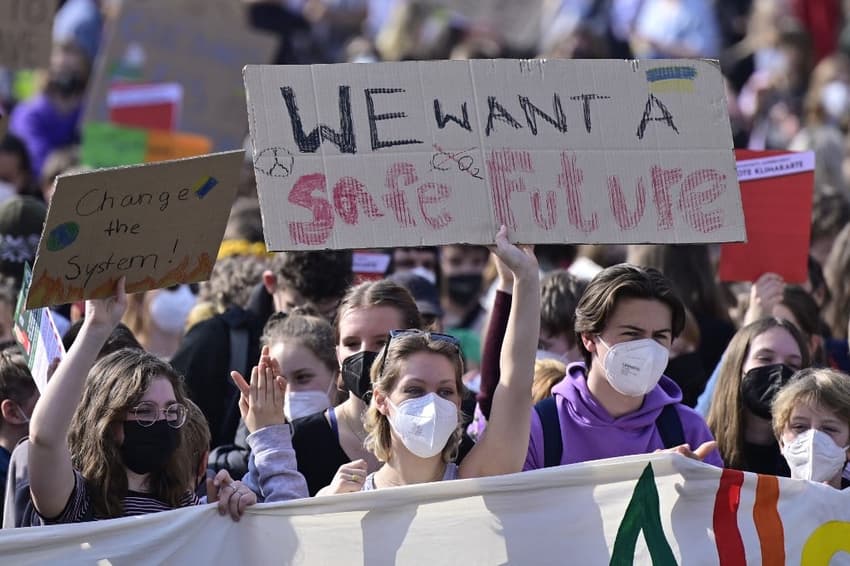Younger generation in Germany would rather 'live in the past'

Young people generally have a reputation for rebelling against society, but rather than dreaming of a better future, a majority of 18-35s in Germany would rather live in the past, an April poll found.
Fifty-six percent of the 18-34-year-olds asked said they would prefer to live in the past, according to an online survey of 2,000 people conducted by the Hamburg-based Foundation for Future Studies (financed by the British American Tobacco company), news agency DPA reported.
Only forty-four percent said they would prefer the future.
But a decade ago, a similar survey had very different results: In 2013, only 30 percent said they would prefer to live in the past, with 70 percent choosing the future as the better option for them.
"This is completely new and very unusual," Ulrich Reinhardt, the foundation's scientific director, told DPA, explaining that as young people, they still had their lives before them so were typically very future-oriented.
Respondents would usually associate the term 'past' with their childhood and youth.
In the 35-54 age group, the number of those nostalgic for the olden days rose to 66 percent from 54 percent previously.
Perhaps unsurprisingly, the number of over-55s who longed for the past had not changed very much over ten years: 68 percent now versus 70 percent in 2013.
"More security"
When asked why they would prefer to live in the past, 42 percent of respondents across all age groups said there was greater solidarity in the past. Thirty-five percent said "because it used to be better".
There was "more security and stability," explained 34 percent of respondents.
Other reasons given included "People were happier" (29 percent), "fewer wars and crises" (23 percent), "environmental conditions were better" (22 percent) and "fear of the future" (20 percent).
Young people in particular missed solidarity and community, Reinhardt said, pointing to the fact that in today's predominantly digital world, people met less frequently to take part in activities outside of their homes.
Reinhardt said it was obvious to many that having friends on Facebook or Instagram was not enough. "It doesn't replace the friends you can rely on when issues arise, when there's a lot of uncertainty and when you just want to have fun," he said.
However, the war in Ukraine did not play a major part in the survey results.
Reinhardt has repeatedly found in surveys that the younger generation strives for security, including in the world of work.
This represents a change from previous decades when the desire to change the world for the better was the prevailing attitude. Under-35s now are looking to the past.
"It's also a generation that was completely pampered by their parents," he added.
Comments (1)
See Also
Fifty-six percent of the 18-34-year-olds asked said they would prefer to live in the past, according to an online survey of 2,000 people conducted by the Hamburg-based Foundation for Future Studies (financed by the British American Tobacco company), news agency DPA reported.
Only forty-four percent said they would prefer the future.
But a decade ago, a similar survey had very different results: In 2013, only 30 percent said they would prefer to live in the past, with 70 percent choosing the future as the better option for them.
"This is completely new and very unusual," Ulrich Reinhardt, the foundation's scientific director, told DPA, explaining that as young people, they still had their lives before them so were typically very future-oriented.
Respondents would usually associate the term 'past' with their childhood and youth.
In the 35-54 age group, the number of those nostalgic for the olden days rose to 66 percent from 54 percent previously.
Perhaps unsurprisingly, the number of over-55s who longed for the past had not changed very much over ten years: 68 percent now versus 70 percent in 2013.
"More security"
When asked why they would prefer to live in the past, 42 percent of respondents across all age groups said there was greater solidarity in the past. Thirty-five percent said "because it used to be better".
There was "more security and stability," explained 34 percent of respondents.
Other reasons given included "People were happier" (29 percent), "fewer wars and crises" (23 percent), "environmental conditions were better" (22 percent) and "fear of the future" (20 percent).
Young people in particular missed solidarity and community, Reinhardt said, pointing to the fact that in today's predominantly digital world, people met less frequently to take part in activities outside of their homes.
Reinhardt said it was obvious to many that having friends on Facebook or Instagram was not enough. "It doesn't replace the friends you can rely on when issues arise, when there's a lot of uncertainty and when you just want to have fun," he said.
However, the war in Ukraine did not play a major part in the survey results.
Reinhardt has repeatedly found in surveys that the younger generation strives for security, including in the world of work.
This represents a change from previous decades when the desire to change the world for the better was the prevailing attitude. Under-35s now are looking to the past.
"It's also a generation that was completely pampered by their parents," he added.
Join the conversation in our comments section below. Share your own views and experience and if you have a question or suggestion for our journalists then email us at [email protected].
Please keep comments civil, constructive and on topic – and make sure to read our terms of use before getting involved.
Please log in here to leave a comment.